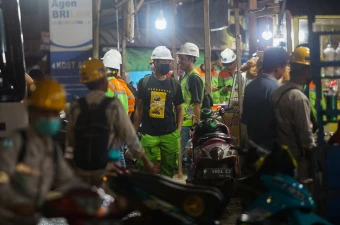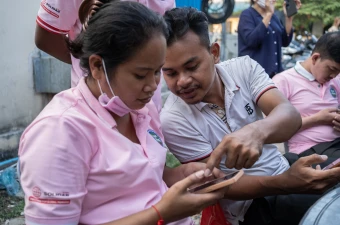STITCH
Sustainable Textile Initiative: Together for Change (STITCH) applauds the European Parliament's ambitious position on the Corporate Sustainability Due Diligence Directive (CSDDD), voted for on 1 June 2023. Based on our joint experience in creating better labour conditions across the highly fragmented garment and textile industry, we see how this position would positively impact workers in global value chains if adopted. It provides a solid basis for negotiations between the legislative EU institutions during the upcoming trialogue. Yet, STITCH has recommendations to make the final directive even more effective.
The internationally recognised UN Guiding Principles (UNGP) and the OECD guidelines stipulate that all companies must conduct human rights and environmental due diligence (HREDD) when doing business. These standards provide extensive and practicable guidance which work as the indispensable backbone of the smart mix of measures for responsible business conduct worldwide. In adopting almost 100 % of the JURI compromise for the CSDDD, the European Parliament's position, compared to those of the Commission of Council, is the closest aligned with the UNGP and OECD guidelines.
Based on our long-term experience with implementing social standards in the garment and textile industry – working together with brands, trade unions (TU) and TU federations, local and international NGOs, manufacturers and their associations, and many others - we particularly applaud the following elements as they are vital to effective human rights due diligence:
The European Parliament has voted for a risk-based approach, explicitly listing risk scoping, assessment and prioritisation, mandating appropriate measures, and insisting on a responsible exit. Taking action where there are the most salient risks is the most effective and efficient method for businesses to prevent, end or mitigate adverse effects on human rights.
With a dedicated article to stakeholder engagement and the explicit protection of vulnerable groups and whistle-blowers, the European Parliament's position acknowledges stakeholders' critical role in the HREDD process, such as providing their invaluable input for businesses' risk scoping and identifying the most suitable remedy for victims of human rights abuses. The position requires companies to actively and continuously engage with (potentially) affected stakeholders and their legitimate representatives, such as trade unions and civil society organisations, or legal or natural persons defending human rights or the environment, actors we know to be vital to creating effective social dialogue.
The definition of 'adverse human rights impact' is the same as in the UNGPs, providing an early warning system and access to remedy through Notification and non-judicial Grievance Mechanisms when such adverse impacts (threaten to) occur. It further mentions specific provisions for stakeholders likely to be the most vulnerable to impacts in a company's value chain, such as women and migrant workers and, in some cases, even extends access by communities and legitimate representatives of potential victims.
Reducing the number of rules and guidelines to one central set of joint guidelines to accompany this legislation is essential to providing clarity and certainty for all businesses conducting HREDD.
Recommendations
While we welcome the international standards and processes already incorporated in the European Parliament's position, we know that with some improvements, the impact of this game-changing legislation could be even bigger. We recommend:
- Broadening the scope to include more companies in specific industries
A scope that covers all companies with over 250 employees, and provisions for clear, detailed guidelines by the Commission and industry experts for risk sectors are significant steps towards driving improvements. However, the textile industry severely affects both people and the planet. Its heavy fragmentation calls for a significantly broader scope of companies conducting their due diligence - proportionate to size and situation. The final directive must acknowledge SMEs' vital role in building the necessary leverage to advance meaningful long-term change.
- Incorporating a company’s purchasing practices more explicitly in the core articles on policy, risk assessment and appropriate measures
Harmful purchasing practices are at the root of many human rights violations on the work floor. Companies should not only assess and adapt purchasing practices as an appropriate measure when mitigating negative impacts, they should continuously and regularly evaluate their own purchasing practices, engaging with suppliers and other relevant stakeholders to prevent causing or contributing to adverse effects. The final text of the directive should clearly specify responsible purchasing practices and accompanying guidelines should refer to sectoral standards such as the Common Framework for Responsible Purchasing Practices for the garment and textile sector.
- Elaborating on access to remedy
Workers whose rights have been violated should receive appropriate remedy within a reasonable timeframe. To achieve this, the final directive must include a Grievance Mechanism that facilitates mediation and more informal remedy, as well as a civil liability regime. While both are provided for in the European Parliament's position, access to the civil liability regime has too high a threshold for victims. To make their case, victims and their legitimate representatives should have access to the relevant information, including documents from brands or authorities. Equally important, there must be a fair division of the burden of proof, whereby when a victim has provided prima facie evidence, the burden shifts to the company in question.
With the above suggestions, we are confident that the directive has the potential to achieve the stated goals of improving human rights and environmental conditions on a global scale while providing certainty, clarity and a level playing field for business.
We urge all legislative EU institutions to support the strong points of the European Parliament's position and address our recommendations to make the final directive even more impactful for people, the planet and business worldwide.
STITCH is a collaboration based on a common vision: a global textile and clothing industry that contributes to an equal and just society by respecting human rights in the world of work. STITCH consists of 6 partners: labour rights organizations CDI in Vietnam and Cividep in India, the Dutch trade unions CNV International and Mondiaal FNV and two multi-stakeholder initiatives ETI in England and the Dutch Fair Wear. The Dutch Ministry of Foreign Affairs is a strategic partner of STITCH and supports the program financially.
Publication date 08 06 2023


